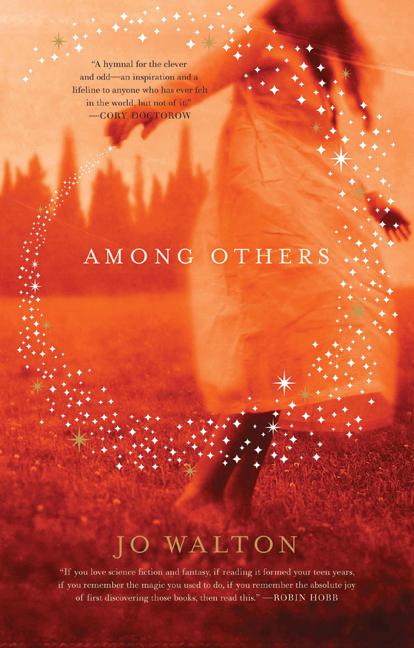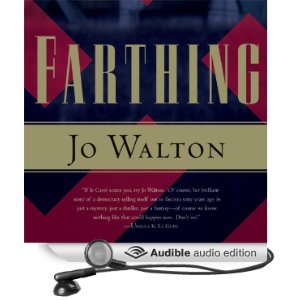I was having a conversation with Zorinth on the way home on the train largely about a (really nifty) story idea of his, and one of the things we were talking about was the things novels need in order to work all the way through, the things you can only see from on top — before you start, after you finish and when you take a deliberate step away during the process to check this stuff. I thought other people might be interested in some of this.
One of the on-top things is what I call jeopardy, by which I mean things being at stake — it can be anything, it doesn’t have to be physical risk. There has to be jeopardy or it doesn’t matter, and there have to be at least two jeopardies (and not too many either, unless you’re Cherryh or Delany) one (or one set) short term and resolvable, and one (or one set) longer term hanging over the whole story and not resolved until the end.
One starts the story where the first thing that leads to the hanging jeopardy begins, and ends it when it is resolved. Not every question raised has to be answered in the end, and the end can be a question, but the hanging jeopardy has to be resolved. For instance, in the story of Goldilocks the hanging jeopardy is that the little girl has blundered into a house belonging to bears, and they will inevitably come back soon. She doesn’t know it, but the reader does. The short term jeopardies concern the things she tries and breaks. You’re interested in the chair and the porridge because you know bears might be coming back and hurting the heroine. (Unless you’re me, in which case it’s a story about violation of hospitality and you’re interested in seeing the bears get vengeance.) The two jeopardies can be part of each other, with the little things opening into the big things, but it’s better if they’re not. If you have lots of immediate jeopardies all precessing over each other, but keep the big one in sight, you will have plot and excitement and wild wild things and something that looks like a story, and you can use this stuff for planning and to keep an eye on the pacing when you look at it from on top, while having it appear to the reader that something interesting is happening. The things at stake don’t have to be huge. It can be whether the porridge is lumpy. I’m really not talking about cliffhanger-type suspense. Jane Eyre has one of the best sets of jeopardies anyone could wish for. It can all be philosophical and complex. But knowing what it is helps me a lot with getting hold of the shape of the story from on top so that I know what I’m doing with that and can get the pacing right when I’m slogging along on the bottom writing one word after the next.
Oh, and for jeopardy to work the reader has to care at least a tad about the characters. They also have to believe in the reality of the risk. The jeopardy doesn’t have to get the characters, but if the reader doesn’t believe it could, you don’t have a story.
You know, people who have done writing courses and read books about how to write probably have proper names for this stuff. (I found out yesterday they call jeopardy “conflict”. I like jeopardy better.) When I was teaching myself how to write, from bedrock, I made up all these terms so as to have ways to talk to myself about it. I also tend to think that everyone else knows all this and will think I’m really dumb for needing to spell it out.
Pacing of revelation is another thing you do when you’re looking at a story from on top, which can be in advance, at revision, or pulling back in the middle to see the whole thing. You, the writer, know what the mysteries are before you start. Maybe you just have the questions, maybe you have the answers as well. (I often find it quite useful and interesting not to have all of them. But if you don’t have them, you can end up with something two-thirds brilliant questions and one third lame explanations.)
But in any case, with SF especially and with other things too there are mysteries of world and mysteries of plot and mysteries of character which will all be revealed as the novel goes on, and one of the things the novel is for is revealing all this, and one of the things I do is to try to control the pace of revelation of all these things so that it will make a satisfying shape for the reader.
That’s all it is. It’s very simple.
And it goes with jeopardy like this. Say you have a phenomenally complex world, and you want the reader to know something about it, and you want them to know it painlessly. You can combine the information with a little jeopardy. You could have the protagonist copy someone’s homework, including the fact, and the jeopardy of the plagiarism and the actual information give you a synthesis. Similarly if you ever have to have great swathes of boring action sequence, you can make them more interesting by incluing world and character revelation into them. (I’m restraining myself from a long digression about incluing here, just so’s you know.)
You have jeopardy and you have pacing of revelation and by balancing the two of them off each other you have plot and you have tension and you have actual pacing.
Also, ideally, the novel will have a climax, which is preferably at the end. At the climax, there will be revelation. This doesn’t have to be the sort of thing where the villain is unmasked. (The climactic revelation at the end of Farthing is that life isn’t fair and good people do bad things.) But what you have to do is pace out the information, the revelations that lead up to other revelations, so that it all comes together at the right time.
A story is like wyrd. The first word can be anything. By the time you reach it, the last word is inevitable.
If you look at the mysteries as utterly unrevealed at the start, even the questions unasked, then when you think about the plan you can also think about setting up the pace at which the questions will be revealed and then the pace at which the answers will. And that’s what I call pacing of revelation.
As for characters — You know, you have characters and you know them really well, and it’s possible to wimp out on doing horrible things to them because you’re fond of them. You write their POV. They are parts of you, and they are people you like. This is why authors do crazy things like promising them you won’t kill anyone they love. They are a character and in their world you are God, what you say goes. You therefore give them good things because you like them, and shy away from doing awful things to them because it would upset you.
This is a problem.
It’s also possible to go the other way and be excessively horrible to them to overcompensate for that.
This is also a problem, and one it’s fairly easy to see and deal with and most people don’t have an ongoing problem with this.
Similarly, when you have awful horrible characters you don’t like, you can want them to have their comeuppance, for the same kind of reasons. This is also easier to resist, and also easier to give in to without ruining the story. The bad are supposed to end unhappily, after all.
The reason any of these things is problem is because if you let the characters, and your feelings about the characters, take over, then you don’t have a story.
And while the characters may be in a sense real to you as a writer, the more important thing is the story. I don’t meant the plot. I never push characters around in service of plot. Plot isn’t even on my radar. But story… if you have a nice character living in a nice house with a nice partner and a nice job and one day the postman delivers exactly what she wants for her birthday and it fits perfectly in her garden… something has to be up with it, or you haven’t got a story. Nothing happens. There is no jeopardy. There are occasional stories in which the fact that there are no events is the story, and goodness knows there’s “Leaf By Niggle”, but on the whole this is harder than hell to get away with. Besides, even if you could do it you couldn’t keep doing it. Stories usually have firm ideas about what they are, at least as much as characters.
Also, as well as being true to the story, you’re often not being true to the characters you love if you make everything easy for them. They wouldn’t be the people they are if they were the kind to be perfectly content with everything. Carmichael loves Jack, and because he loves Jack he has to spend an excruciating evening in a gay bar. If he didn’t love Jack he wouldn’t be Carmichael, and if Jack didn’t want to go to the gay bar he wouldn’t be Jack. Similarly with killing characters even if you care about them — in real life, good people die. If they don’t die ever in the story, it’s getting away from real life, and it’s getting over into wish-fulfillment and not being true to itself. Besides, with character death it’s not so much that I murder them as that they do the thing that gets them killed because they are the people they are, and denying that is denying them the very agency people who love their characters claim they have.
(I was just going to say I hadn’t killed anyone in Half a Crown yet. I haven’t killed anyone except millions of offstage Jews, communists and dissidents. They were killed because they were the people they were, every one of them, and because the people who killed them were the people they were, because when the guy in charge asked if any of the soldiers didn’t feel like massacring Jews that day and they could go back and guard the truck, only 14 out of the battalion went to guard the truck. That would be in Ordinary Men and the real world, not in Half a Crown. This incident does not appear in Half a Crown, it just invisibly permeates it.)
Anyway, sorry, characters. It’s better not to let them know you’re there and can be bargained with, because if they can try to get better deals they will, whether it’s good for them or not.
In the end, what matters is the story be something the reader can recognise as true to itself. If you don’t have that, you don’t have a story, just a heap of shards. And if the story is true to itself, the characters will be. And that means sometimes you have to do horrible things to characters you like either because they are the characters they are or because you are, within that world, Necessity, which rules all ends.
It does mean you can’t really be a writer and know yourself and remain a nice person. But that’s OK, because the story is more important than that too.




